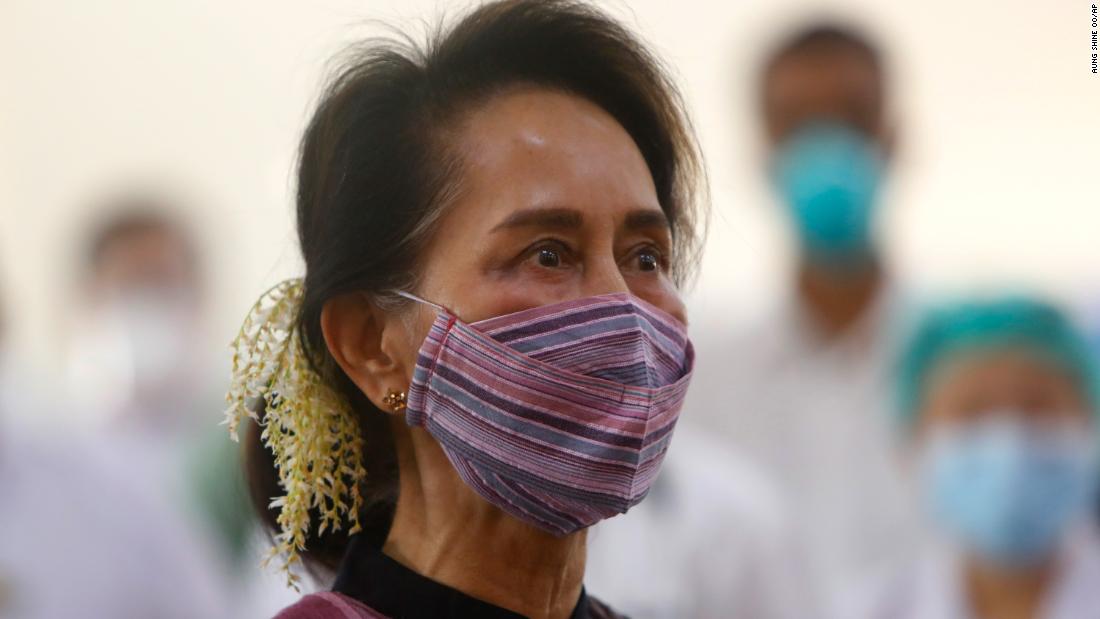Suu Kyi, who was the country’s de facto leader under the title of state advisor, received an arrest warrant for violating the country’s import and export laws.
National League for Democracy (NLD) spokesman Kyi Toe posted on his Facebook account on Wednesday that Suu Kyi will be detained until February 15.
“According to reliable information, a 14-day arrest warrant has been issued against Daw Aung San Su Kyi under the Import and Export Act,” he said.
Deposed President Win Myint was also detained in custody under the country’s Disaster Management Act, Kyi Toe said.
Several lawmakers and senior officials from the National League for Democracy (NLD) Party were also detained, with about 400 held in a guesthouse in the capital.
Cementing his government, the new governing board removed 24 government ministers and deputies and appointed 11 of its own allies as substitutes who will take up their positions in a new administration.
The sudden takeover of power came when the new parliament was about to open and after months of growing friction between the civilian government and the powerful military, known as Tatmadaw, over alleged electoral irregularities.
Suu Kyi’s party, the NLD won a landslide victory in the November 2020 elections, only the second since the end of the military regime, with 83% of the votes, which guaranteed it another five years in government.
The country’s electoral commission has repeatedly denied mass electoral fraud.
Analysts suggested the coup had more to do with the military’s attempt to reaffirm its power and the personal ambition of Army Chief Min Aung Hlaing, who was due to resign this year, than with serious allegations of electoral fraud.
After the coup, hospital doctors across the country prepared to protest despite the coronavirus pandemic.
Medical assistants at Yangon General Hospital released a statement promising their participation in the “civil disobedience movement”, saying they would not work under a military-led government and called for Suu Kyi’s release.
The video showed medical workers in Yangon outside the hospital on Wednesday, dressed in their uniforms and protective gear, while wearing red ribbons.
Myanmar’s Ministry of Information warned the media and the public on Tuesday not to spread rumors on social media or incite unrest, urging people to cooperate with the government after Monday’s coup.
“Some media outlets and the public are spreading rumors on social media, conducting meetings to incite turmoil and making statements that can cause disquiet,” the statement said. “We would like to urge the public not to perform these acts and we would like to notify the public to cooperate with the government under existing laws.”
Anxiety is growing in Myanmar about what lies ahead and many in the country have asked the international community to increase pressure from the government.
For more than 50 years, Myanmar, formerly known as Burma, was ruled by successive isolationist military regimes that plunged the country into poverty and brutally stifled dissent. Thousands of critics, activists, journalists, academics and artists were routinely arrested and tortured during this period.
Suu Kyi gained prominence during his decades-long struggle against the military regime. When his party, the NLD, won a landslide victory in the 2015 elections and formed the first civilian government, many pro-democracy supporters hoped this would mark a break with the military regime of the past and offer hope that Myanmar would continue the reform.
“We know that the military cannot be trusted to respect people’s human rights and the rule of law in Burma,” said Bo Kyi, co-founder of the Association for Assistance to Political Prisoners. “When the military was in charge, political prisoners like me were arrested, sent to prison for decades, (placed) in solitary confinement and tortured. We are concerned that, if this state of emergency is not reversed, similar things will happen again,” added Kyi, who is also a former political prisoner.
“There is a fear that the military may continue to pursue officials, activists and repress ordinary people. But we hope that Burma can return to its democratic path.”
